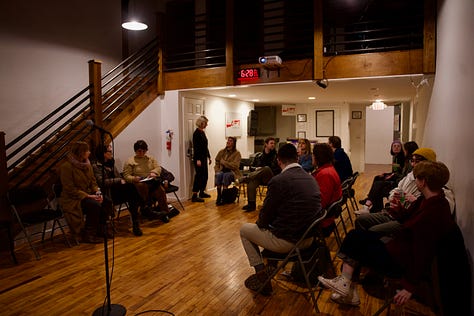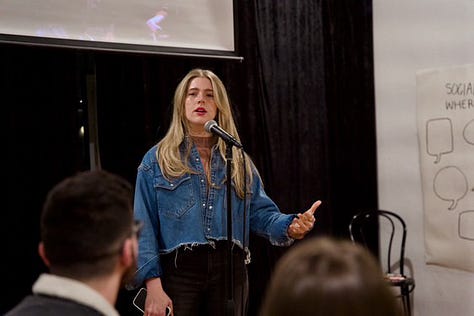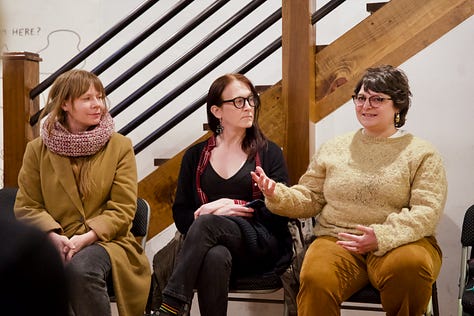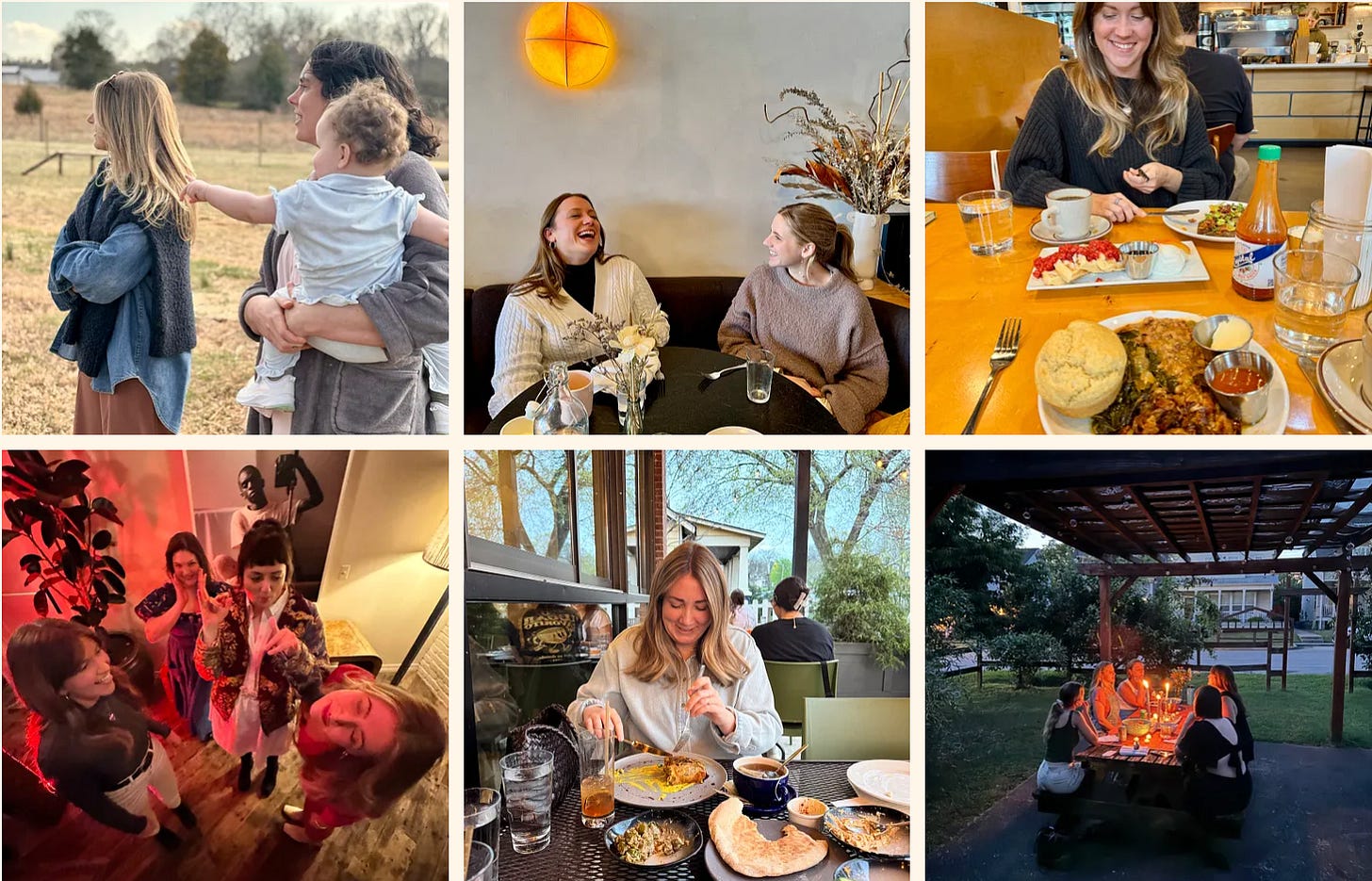I muted you on Instagram. Did it make me a better friend?
On my year of longform, watching vs. witnessing, and becoming what we behold.
I’ve muted all my friends on Instagram. One by one, I long-pressed each of their precious little faces, clicked MUTE, and watched their photo gray out and fade away.
I felt like an absolute monster.
At best, muting my friends felt rude. At worst, it seemed borderline neglectful. What if they noticed and felt unloved? What if I missed out on something important about their lives?
Well, almost immediately, I did.
I was catching up with a friend from a previous job, a busy mom and business owner who I see every couple of months and otherwise just on social media. Since muting everyone, I hadn't gotten an update from her in a while. She shared some highlights about her job and family. Then, as an afterthought:
"Oh, and I won that contest," she said.
She was already moving on to the next topic when I interrupted her.
"Wait," I said. "What contest?"
I imagined she’d submitted a witty caption for a local newspaper or won a gift basket in a church raffle.
"It was a Super Bowl sweepstakes," she said, visibly startled that I didn't already know. "I…won a million dollars."
A million dollars.
ONE. MILLION. DOLLARS.
And I hadn't heard a peep.
This was my new approach to social media. And everything was going exactly according to plan.
This all started when I declared 2025 my "Year of Longform."
Does your brain ever feel like one long staticky screech? Mine did, increasingly. When I spend too much time with short-form media, I get this tight-chested, panicky, fragmented feeling that follows me long after I scroll away or close the app.
Social media wasn’t just changing what I thought about. It seemed to be truncating my actual thoughts, chopping them into bite-sized segments. When I’d write tweets, my thoughts were tweet-length. When I spent time on Instagram, they were caption-length. When I watched TikTok or Reels, they came in 30-second bursts.
The research supports this: new technologies change our cognition. As Marshall McLuhan (the "medium is the message" guy) wrote:
"We become what we behold. We shape our tools and thereafter, our tools shape us."
My brain had become a constant, flickering reel of moving images and internet slang. It was physically and emotionally exhausting. I was always a tiny bit nauseated. As a writer, nothing could be more terrifying than permanently eroding my ability to think deeply.
That's when I decided to declare this my Year of Longform.
In 2025, I would prioritize depth over quantity. I traded podcasts for audiobooks, TV series for films, singles for full albums. I committed myself to the teetering stack of books in my to-be-read pile. I started memorizing poetry as an antidote for my social media-addled attention span. To the best of my ability, I would not scroll. I wouldn't watch short-form videos, TikToks, or Instagram Reels.
At first, it didn't occur to me to include Instagram stories in this roundup.
Those were different. Those were my friends! I have a responsibility to stay up to date, to watch their every update as a gesture of my love and loyalty! After all, as a friend, I must be a witness to their lives, right?
Yet even as I moved the rest of my media consumption to longform, and felt the mental relief almost immediately, I couldn't ignore the constant hum of vague panic that ramped up as I clicked through stories. No matter how much I loved someone, the act of consuming their lives in 15-second increments left me perpetually seasick.
In the same way social media was reshaping the way I thought, I'd begun to suspect that it was also reshaping how I related to my loved ones.
In Consolations, David Whyte defines friendship as witness:
"The ultimate touchstone of friendship is not improvement, neither of the other nor of the self, the ultimate touchstone is witness, the privilege of having been seen by someone and the equal privilege of being granted the sight of the essence of another, to have walked with them and to have believed in them, and sometimes just to have accompanied them for however brief a span, on a journey impossible to accomplish alone."
I had been watching my friends’ lives online for decades. And over that time, especially with the advent of real-time posting like stories, I’d noticed how that instinct to connect with them—to actually reach out to them or see them face-to-face—eased, slightly but noticeably, when I watched them online.
Oh, she’s having fun! She’s all good! And maybe even a dash of: Look, she doesn’t even need me. Of course, that’s far from the truth. Anyone who’s posted online can attest to that. Yet watching them online still subtly tricked me into thinking I had done the work to maintain those relationships. It gave me the illusion of intimacy with none of the reality.
I was watching, yes. But I wasn't witnessing.
So I did the most loving thing I could think of: I muted them all.
After the Great Muting, I began to notice how many interactions with my friends assumed context I no longer had. When I saw them in person, they'd skip over whole stories and significant happenings, assuming I'd seen it online already. They give it a glancing mention, a you-know-this-already handwave.
Except now I didn't know it! Tell me!
That's how I found out one friend had gotten pregnant, another had been hit by a car (he’s fine), and another had sold her first book. Or, yes, won one million dollars.
Take the newly-minted millionaire friend, for instance. Yes, I was two months late to possibly the biggest news of her life. But, in this new paradigm, I got to experience a much more intimate and delightful interaction than a 'like' and OH MY GOD comment on social media. Face-to-face, I squealed and gasped and asked my nosiest and most invasive questions in real time. (So…what was that after taxes?)
Removing those voyeuristic check-ins required me to rethink what it means to be social. In their absence, I realized how readily I'd contorted my understanding of friendship and connection into the shape of these tools.
The delightfully straightforward and misspelled Leave Instagram landing page describes social media as "ready-made templates for social interaction.”
These templates were always meant to constrain our imaginations, forcing us to squeeze the unruly togetherness of life into the mold of commodities and market. Instead, let's embrace the supposed "inconvenience" of needing to socialize with intention. Every connection with our friends, family, comrades, and future comrades is an opportunity for creativity. We have neglected the care that is required to maintain relationships for too long.
I love that phrase, "unruly togetherness," and the call to think of relationships as a creative, imaginative act—rather than something scripted, templated, and bound to a revenue-generating tech platform. I love thinking about “the care that is required” and what that means to me.
What would it look like to become more creative and imaginative about my close relationships? Could I offer my friends and myself a better version of attention? A better version of me, one who is deeply engaged and curious? Rather than observing their lives from an audience, could I be a more active participant?
There was a time when I didn’t understand the distinction between those last two because I thought my life was supposed to be a performance. And I was so good at performing! I didn’t fully understand what it meant to be truly seen until my own life (which had looked so impenetrably perfect and curated up until then) fell apart, and suddenly I was crying in front of friends over dinner, or FaceTime, or on the trails of Shelby.
Now I know: Being watched and being witnessed are not the same thing. Not even close.
Listen, I’m well aware that writing about social media is unavoidably cringey. It either comes off as proselytizing or Pollyanna-ish. Yet I persist.
I'm not anti-tech or even anti-social media. These tools have brought so much richness, connection, and even inspiration to my life. My close relationships are still technology-enabled. I'm trying to use technology as a route to intimacy rather than a stand-in for it.
Without relying on digital check-ins, keeping up with my friends has indeed evolved into a more imaginative, creative act. It has required me to find new forms of knowing, intimacy, and connection.
I text more, of course. I call. I fly to see my friends who live far away. Daily, my writing group and I exchange emotional, unhinged video messages that (god willing) the outside world will never see. Yesterday, my best friend showed up unannounced at the place where I was writing this newsletter, having checked my location on her phone.
This weekend, I walked to a book swap at the local coffee shop where I spontaneously chatted with folks about what they were reading. Rather than an algorithmic book recommendation, I was handed a secondhand selection directly from my friend
.I also make it a point to attend events in person. At a recent artist gathering about the role of social media in our creative lives, I realized an inherent irony while looking around the room: I'd met everyone there online. I'd gotten connected to some of my favorite artist communities through DMs and digital flyers and reshared event postings. But then (and here's the important part) I showed up. And kept showing up.
Technology can connect communities, but it can't build or sustain them. That requires friction, intention, and inconvenience. But the end result—unruly togetherness (!)—is infinitely worth the effort.



Four months in, everyone is still muted.
The first quarter of my Year of Longform has already made my mind a much calmer place to inhabit, one with a lot more space for deep thought and attention. My mind is quieter. My relationships are deeper. My friends don’t even seem to hate me! (Unless I’m about to start my period, but they insist that’s all in my head.)
It's hard to get comfortable with knowing less, knowing late, or not knowing at all. There's a part of me that still feels guilty. I worry that my not-knowing will be interpreted as not caring—when it's actually the opposite.
Opting out of my friends’ online worlds has created the space for me to engage more deeply and lovingly with them in real life. To truly behold them. To be a witness, not a watcher.
Remember: I muted you because I love you.
Love,
Lane 💋
P.S. If you’re reading this and thinking, “That’s not true, Lane watches all my Instagram stories,” then now you know I have a crush on you.







Great piece.
I have mixed feelings on this.
I did a “dry January” off all social media earlier this year and after going through withdrawals (crazy) I noticed less anxiety and more mindfulness of the present.
What hurt, though, was that despite being someone who was very active on social as a creator, only one single person reached out to ask if I was ok after weeks of sudden social silence.
It made me realize how these supposed friends on social who are constantly watching my stories but never interacting with me didn’t even have the excuse that they were feeling connected by watching my stories when I was off for the month.
So as long as you’re actually keeping in touch in real life, social media isn’t as important (unless it means less support for your content creating friends).
But, in my experience, people have become incredibly lazy in maintaining deep relationships and removing social reduces the last bit of exposure many people have to feeling connected.
Glad you didn’t unSubstack!